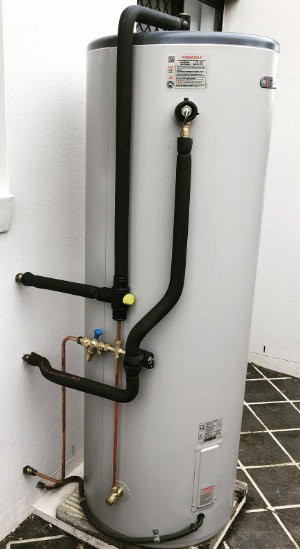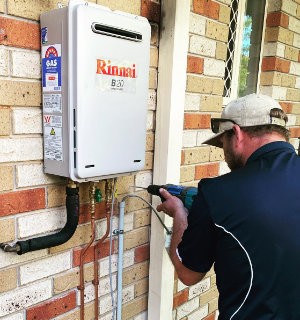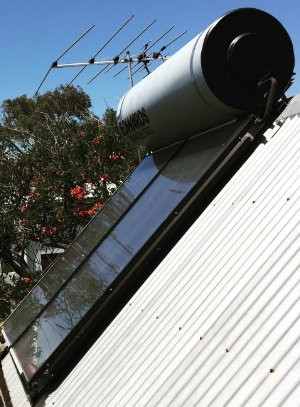What Types of Hot Water Systems are there?
Hot water systems are an integral part of our day-to-day life and every home needs one, so whether you are looking for a new one or replacing an old one you need a hot water system. But which to get? Well, Hot water systems are broken up into 4 main types each with their benefits. Read on for more information on these four different types or give us a call to discuss hot water system installation and the right hot water system for you.
1. Electric Storage Hot Water Systems

Electric hot water systems are some of the most popular hot water systems in Australia. Electric hot water systems work much like a kettle. Where a heating element is placed at the bottom of an insulated tank and heats the water within it. There are some key points of interest when buying an electric hot water system they are as follows.
Off-peak Electric Hot Water Systems
One downside to electric hot water systems is that they can use a lot of electricity however their electricity consumption can be minimised through the use of an off-peak system. Off-peak hot water systems have a larger tank than that of other electric hot water systems. This allows them to heat when peak electricity tariffs may not be in place, which makes the running cost much lower. However, in electric water heaters, the tanks will lose some heat as the day goes on therefore the heater will still run even when the hot water is not in use (this is referred to as standing costs). Off-peak systems can also have a second booster element at the top of the tank to help maintain water temperature during use. Off-peak systems use a larger tank than that of a normal electric storage hot water system this leads them to be a little more expensive at installation but cheaper in the long term.
Instantaneous Electric Hot Water Systems
Instantaneous systems work by running the water through a coiled pipe where it is heated up as it travels to the tap. However, as they are immediate and don't have a storage tank the water will only start heating up when the tap is turned on. This will lead to a delay in the hot water. The upside to not having a storage tank means that these systems don't have standing costs as the water is not being kept warm, however, this will mean that the system will be run during peak power tariffs leading to higher running costs.
2. Gas Hot Water Systems

Gas hot water systems are similar in some aspects to electric however in a lot of cases they are more energy efficient and cheaper to run unless you have solar. Gas unlike electricity doesn't have peak usage tariffs, so a gas hot water system can run at anytime at the same price. They can also be run off either natural gas or LPG, with natural gas being cheaper. There are two different types of gas hot water systems as follows.
Storage Gas Hot Water Systems
Storage hot water systems work by having a storage tank with a gas burner built in underneath it that heats the water. These systems will need to be stored outside or have a ducting system. Some systems use gas pilot lights that require a constant supply of gas to allow the main burner to ignite to heat the tank. However, some will use electric igniters that save on gas usage. Storage systems do lose a lot of heat from the bottom of the tank where the burner is as this area cant be insulated.
Instantaneous Gas Hot Water Systems
Instantaneous systems are far more efficient than storage gas systems, as they don't use a tank to remove any heat loss from the cylinder. These systems use a coiled pipe that is heated up by a gas burner. They will also only heat the water as it is needed. This means that the heater will need a consistent supply of gas to allow for hot water at any time.
3. Heat Pump Hot Water Systems
Heat pump hot water systems are one of the most efficient hot water systems on the market using up to 75% less electricity than electric storage hot water systems. Heat pump hot water systems work much like an aircon. It saves electricity by using the heat from the air that the evaporator draws out rather than using the electricity to heat the water. For that reason, heat pumps will be more efficient at warmer temperatures, but some can still operate below freezing. Cooler temperatures also affect the reheat time of the system. However, most systems are built with a booster element if needed.
Much like an aircon, heat pump systems need to be well-ventilated with access to fresh air. As Heat pump hot water systems have a compressor they will make a noise like an aircon so placement should be considered. Standing losses also occur in these systems as they have storage cylinders. However, they can be set up to operate in off-peak tariff times but the tank will need to be adequately sized to meet needs.
There are two major types of heat pump hot water systems:
Integrated Heat Pump Hot Water Systems
Integrated Systems have the heat pump mounted on top of the cylinder this allows for the system to be more compact and have less of a footprint. However, in some cases, the evaporator can be separated or wrapped around the cylinder. Integrated systems will be heavier than a split system of the same size. These systems will have to be stored outside as it is one unit.
Split Heat Pump Hot Water Systems
Split systems have the Heat pump as a different unit to the cylinder much like a split system aircon. The benefit of this is the units are lighter, as well as allowing for the cylinder to sit inside the house. Split systems work slightly differently from integrated systems as the compressor pumps refrigerant gas through a heat exchanger in the cylinder compared to heating the water through the heat pump. The two units are connected by insulated refrigerant piping.
4. Solar Hot Water Systems

Solar Hot water systems Have high upfront costs but unlike all other hot water systems, have little to no long-term running costs. There are a few different types of solar hot water systems below are a few of the most common types.
Closed-coupled or Thermosiphon hot water systems
These Hot water systems have a tank and panels on the roof and use the process of thermosiphon to collect hot water. Thermosiphon is where the water flows down into the panels and is heated up by the sun, as it heats up it becomes lighter and rises into the tank to be stored. When purchasing a thermosiphon hot water system you will need to be careful of whether your home is prone to frost, if it is you will need to go with an indirect system. Indirect systems use an anti-freeze such as glycol to cycle through the panel that will then pass through a heat exchange coil in the tank to heat the water.
Pumped or Split systems
Pumped or split systems unlike Closed coupled systems rely on a small electric pump to run water through the panel the benefit of this will mean that the tank does not need to be on the roof. This is beneficial if the roof is not strong enough to hold the tank. Another benefit of split systems is the tank can be either inside or outside which will allow for the tank to retain heat better and allow for ease when connecting an electric booster. However, these systems can lose some heat due to the longer distance between the panel and the tank.
Evacuated Tubes versus Flat Panel
Evacuated tubes and flat panel collectors are the two types of collectors on the market both have their benefits and work with either system. Flat panel collectors are the cheapest of the two they use a flat panel and a heat-absorbent layer covered in either glass or plastic to heat the water. These collectors are cheaper to install and maintain than evacuated tubes. However, evacuated tube collectors can run up to 163% more efficiently than flat panels but cost more to install and maintain. They also work better than flat panels in cooler climates.
References:
Canstar Blue - Hot Water System Installation Cost
Sustainability.vic.gov.au - Electric Hot Water Systems
Choice.com.au - Hot Water Systems
Solar.vic.gov.au - Planning Hot Water Systems
Sustainability.vic.gov.au - Solar Hot Water Systems
Choice.com.au - Solar Hot Water Systems
Sustainability.vic.gov.au - Gas Hot Water Systems
Canstar Blue - Gas Hot Water Systems
Canstar Blue - Instant Hot Water Systems
Sustainability.vic.gov.au - Heat Pump Water Heaters
Solar.vic.gov.au - Heat Pump Hot Water Systems